Welcome to the enchanting world of Maine Coon kittens ct, where these magnificent felines captivate hearts with their gentle giants stature and captivating personalities. Embark on a journey filled with intriguing facts, expert care tips, and heartwarming adoption stories that will leave you smitten with these beloved companions.
As we delve into the world of Maine Coon kittens ct, you’ll uncover the secrets to their captivating charm, from their distinctive physical traits to their playful and affectionate nature. Whether you’re a seasoned cat enthusiast or a first-time feline admirer, this comprehensive guide will provide you with all the essential knowledge to welcome a Maine Coon kitten into your life.
Breed Characteristics
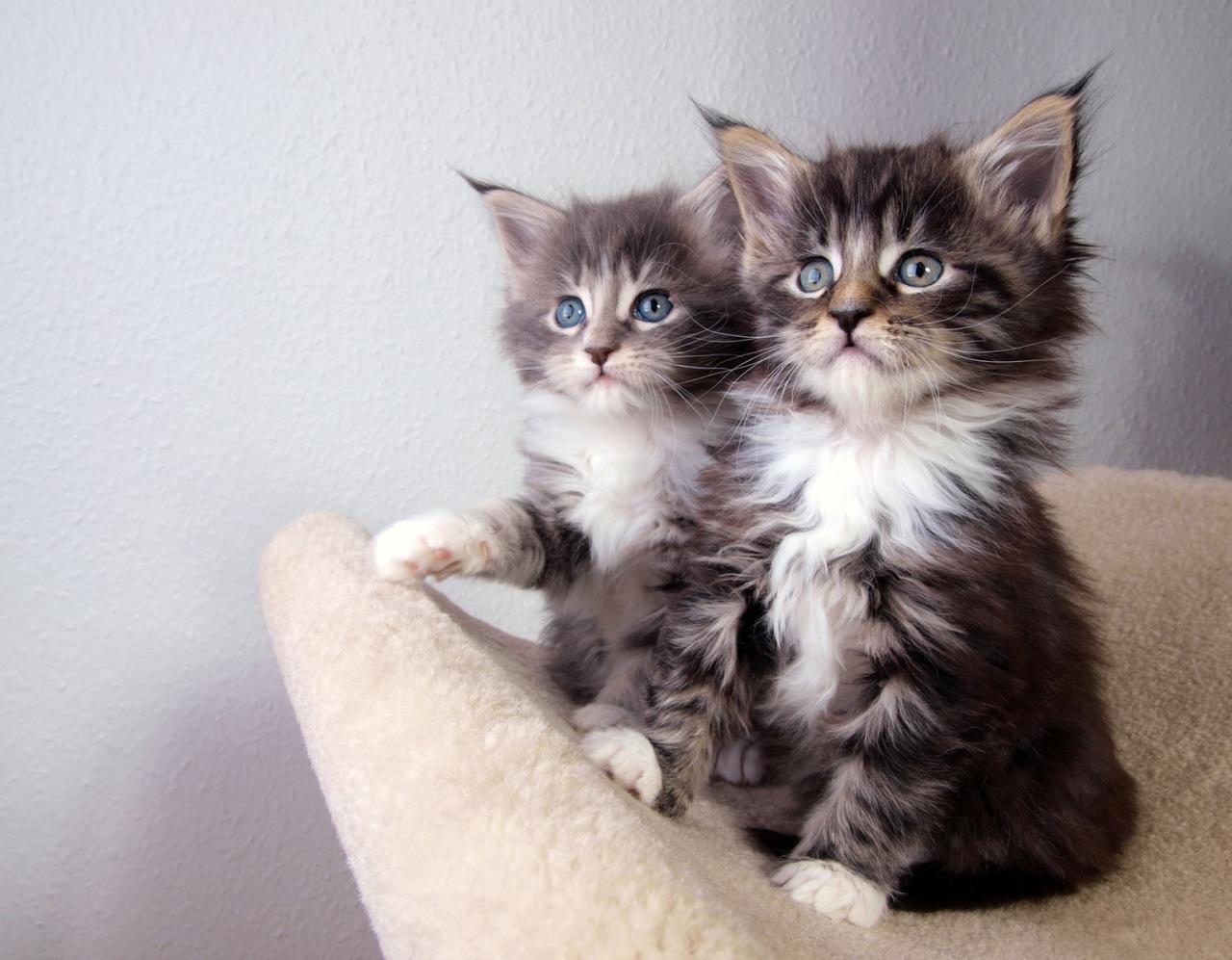
The Maine Coon is a large, semi-longhaired breed of domestic cat with a distinctive physical appearance and a gentle, affectionate personality. It is one of the largest domesticated cat breeds, with males typically weighing 13-18 pounds and females weighing 8-12 pounds.
The Maine Coon’s coat is thick and shaggy, with a water-resistant texture that helps to protect the cat from the cold and wet climate of its native Maine.
The Maine Coon’s head is large and square, with a broad muzzle and large, expressive eyes. The ears are large and set high on the head, with tufts of fur on the tips. The tail is long and bushy, and the legs are muscular and well-proportioned.
The Maine Coon’s coat comes in a variety of colors and patterns, including brown tabby, black, white, and blue.
Temperament
The Maine Coon is known for its gentle and affectionate personality. They are playful and energetic, but they are also very laid-back and easygoing. Maine Coons are great with children and other pets, and they make excellent companions for people of all ages.
History and Origins
The Maine Coon is thought to have originated in the state of Maine in the United States. The breed is believed to have developed from a cross between a domestic cat and a wild bobcat. The Maine Coon was first recognized as a breed in the late 1800s, and it quickly became one of the most popular cat breeds in the United States.
Unique Features
The Maine Coon is a unique breed of cat with several distinctive features. These features include:
- Large size
- Thick, shaggy coat
- Water-resistant coat
- Large, expressive eyes
- Tufts of fur on the tips of the ears
- Long, bushy tail
- Muscular, well-proportioned legs
- Variety of colors and patterns
- Gentle and affectionate personality
Kitten Care
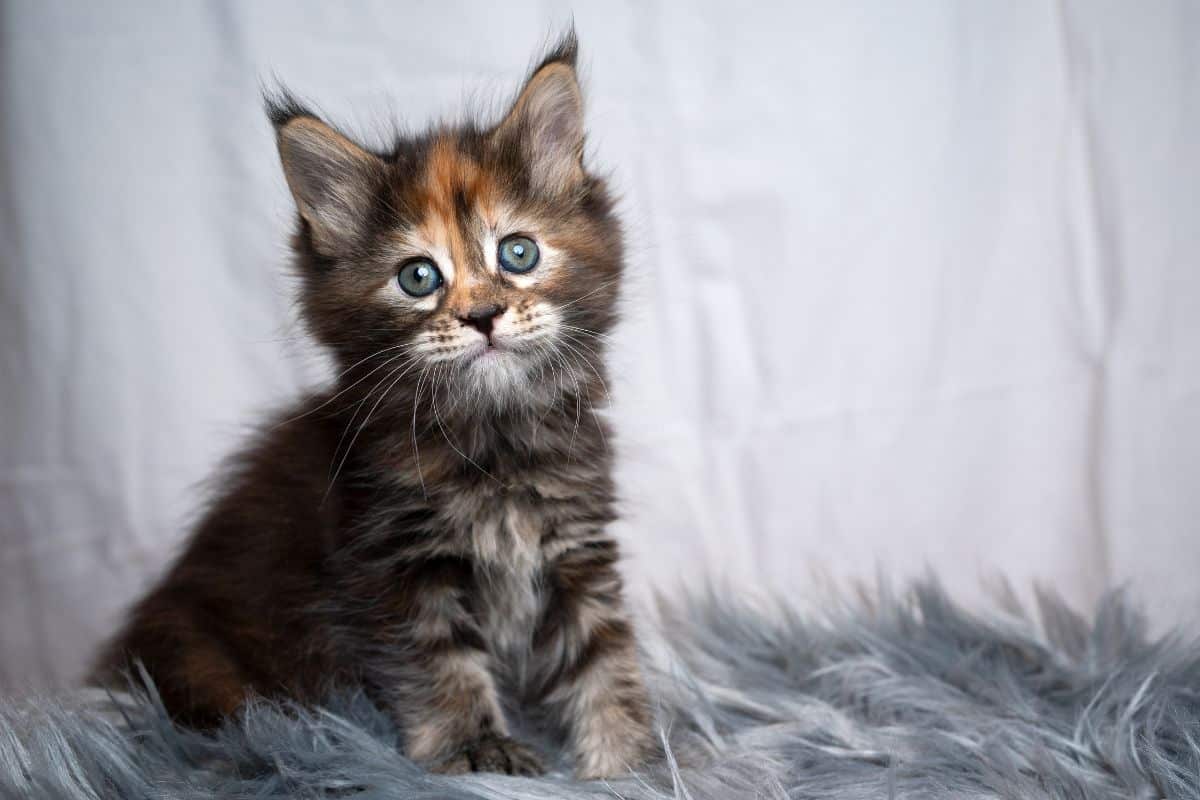
Maine Coon kittens require special care to ensure their health and well-being. Here are some specific care requirements and tips to help you raise a healthy and happy Maine Coon kitten:
Feeding
Maine Coon kittens need a high-quality diet that is specifically formulated for kittens. Feed your kitten three to four small meals per day, and adjust the amount of food you give them as they grow. Avoid giving your kitten table scraps or human food, as this can be harmful to their health.
Grooming
Maine Coon kittens have long, thick fur that requires regular grooming. Brush your kitten’s fur at least once a week to remove any mats or tangles. You should also bathe your kitten every few months to keep their fur clean and healthy.
Socialization
Maine Coon kittens are social creatures that need to be exposed to a variety of people and experiences in order to develop properly. Take your kitten to the vet for regular checkups, and introduce them to other people and animals in a positive and controlled environment.
Choosing a Healthy Kitten
When choosing a Maine Coon kitten, it is important to look for a breeder who is reputable and who has a good track record of breeding healthy kittens. Visit the breeder’s facility and meet the kittens in person before you make a decision.
Look for kittens that are active, playful, and have clear eyes and ears.
Common Health Issues
Maine Coon cats are generally healthy, but they can be prone to certain health issues, such as:
- Hypertrophic cardiomyopathy (HCM):A condition that causes the heart muscle to thicken and can lead to heart failure.
- Polycystic kidney disease (PKD):A condition that causes cysts to develop in the kidneys and can lead to kidney failure.
- Hip dysplasia:A condition that affects the hip joint and can cause pain and lameness.
Regular veterinary checkups and early detection can help to prevent or manage these health issues.
Adoption and Availability
Finding a reputable breeder or adoption agency is crucial when considering adopting a Maine Coon kitten in Connecticut. These organizations prioritize the well-being of the kittens and ensure responsible placement in loving homes.
Reputable Breeders
- Whiskas Maine Coons:Located in New Milford, this breeder specializes in championship-quality Maine Coon kittens. They have a strict screening process and provide lifetime support to adopters.
- Shadowwood Maine Coons:Based in Bethany, this breeder focuses on breeding healthy and affectionate Maine Coon kittens. They offer a one-year health guarantee and support adopters with ongoing advice.
Adoption Agencies
- Connecticut Humane Society:This statewide organization often has Maine Coon kittens available for adoption. They have a comprehensive adoption process, including a home visit and reference checks.
- Friends of Felids:Located in Westport, this rescue organization specializes in cats and kittens. They have a dedicated foster program for Maine Coons and provide support to adopters.
Adoption Fees and Waiting Lists
Adoption fees for Maine Coon kittens in Connecticut typically range from $800 to $1,500, depending on the breeder or adoption agency. Some organizations may have waiting lists, so it’s recommended to inquire about availability in advance.
Screening Processes
Both breeders and adoption agencies conduct thorough screening processes to ensure the kittens are placed in suitable homes. They may require a home visit, reference checks, and a discussion about your experience with cats.
Success Stories
“We adopted our Maine Coon kitten from Whiskas Maine Coons, and we couldn’t be happier. He’s a sweet and playful companion who brings so much joy to our lives.”
John and Mary, Hartford
“Our family adopted a Maine Coon kitten from Friends of Felids. The staff was incredibly supportive and provided us with all the information we needed to care for our new furry friend.”
Emily, Stamford
Training and Behavior
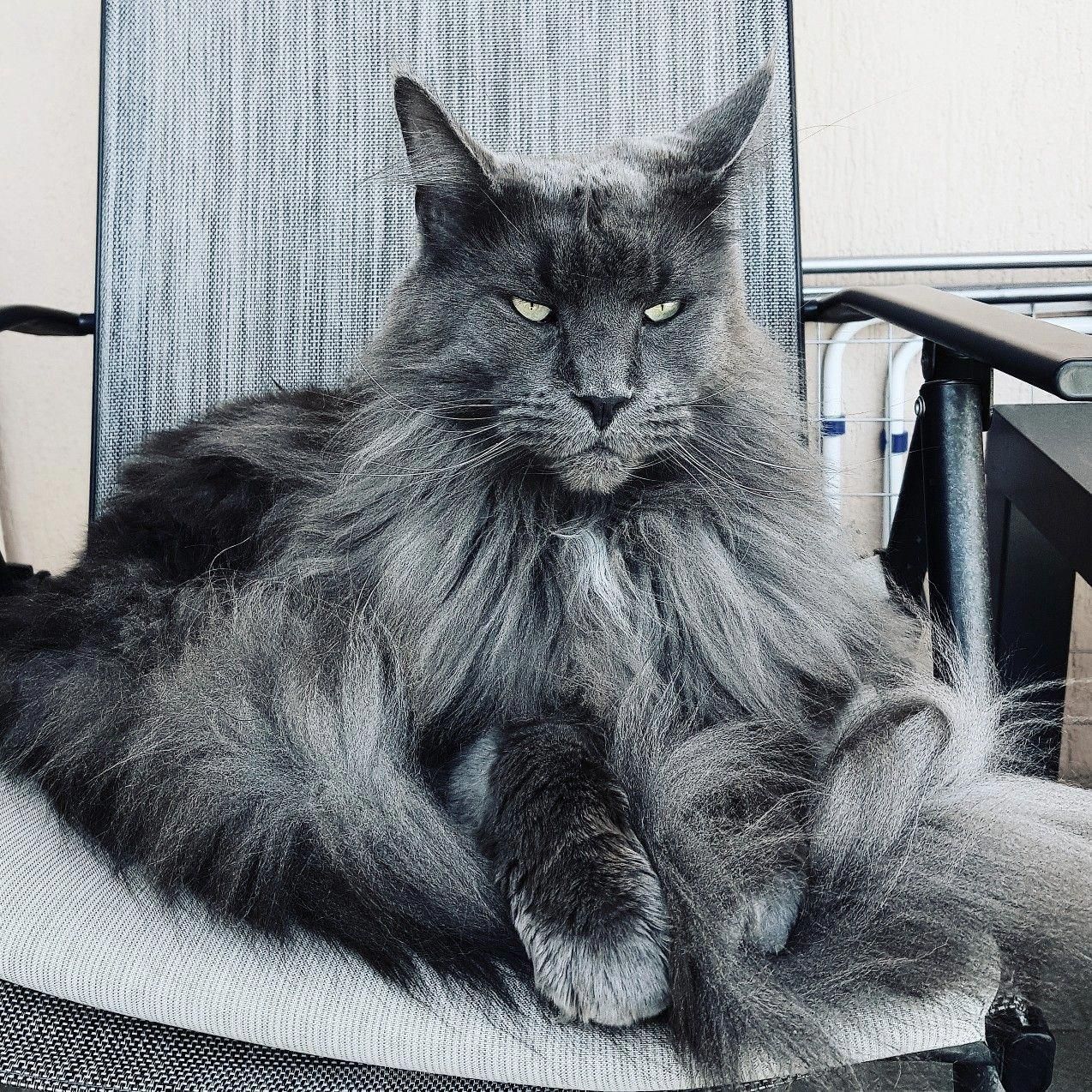
Maine Coon kittens are intelligent and eager to please, making them relatively easy to train. With patience, consistency, and positive reinforcement, you can teach your kitten basic commands and good manners.
Positive Reinforcement
Positive reinforcement is the most effective way to train kittens. This involves rewarding your kitten with treats, praise, or petting when they exhibit desired behaviors. Avoid punishment, as this can damage your bond with your kitten and make them fearful or aggressive.
Basic Commands
- Sit:Hold a treat in front of your kitten’s nose and slowly move it backward. As they follow the treat, their bottom will naturally lower to a sitting position.
- Stay:Once your kitten knows how to sit, say “stay” and hold your hand out in front of them.
Gradually increase the distance and duration of the stay command.
- Come:Call your kitten’s name and shake a treat bag or rattle a toy. As they come towards you, say “come” and reward them.
Resolving Common Behavioral Issues
Even well-trained kittens can sometimes exhibit undesirable behaviors. Here are some tips for resolving common issues:
Scratching
Provide your kitten with plenty of scratching posts and encourage them to use them by rubbing catnip on them. Trim your kitten’s nails regularly to reduce damage to furniture.
Biting
Never allow your kitten to bite you during play. If they do, immediately stop playing and walk away. Redirect their chewing to appropriate toys.
Litter Box Avoidance
Ensure your kitten’s litter box is clean, easily accessible, and large enough for them to comfortably use. If your kitten is avoiding the litter box, rule out any underlying medical issues and try changing the litter type or location of the box.
Health and Veterinary Care
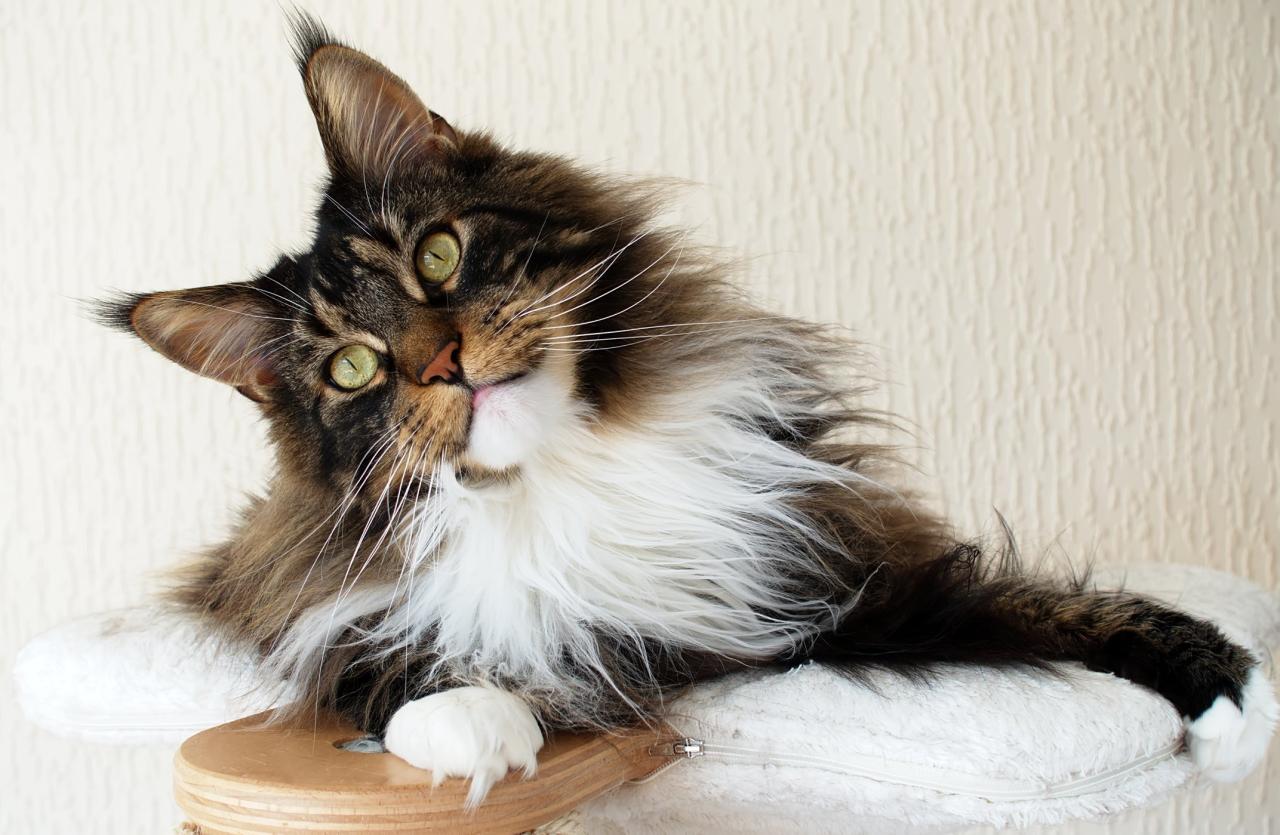
Maine Coons are generally healthy cats, but like all breeds, they are prone to certain health conditions. It is important to be aware of these conditions so that you can take steps to prevent or treat them.
Recommended Veterinarians in Connecticut
Here is a list of recommended veterinarians in Connecticut who specialize in feline care:
- Animal Medical Center of Danbury, Danbury
- Brookfield Animal Hospital, Brookfield
- Catnip Cottage Veterinary Clinic, West Hartford
- Greenwich Animal Hospital, Greenwich
- Norwalk Veterinary Hospital, Norwalk
Regular Checkups, Vaccinations, and Dental Care
Regular checkups are essential for maintaining your Maine Coon’s health. During a checkup, your veterinarian will examine your cat from head to toe, check for any signs of illness, and update their vaccinations. Vaccinations are important for protecting your cat from serious diseases, such as rabies, distemper, and feline leukemia.
Dental care is also important for your cat’s health. Regular dental cleanings can help to prevent gum disease and other dental problems.
Potential Health Concerns
Some of the potential health concerns that Maine Coons are prone to include:
- Hypertrophic cardiomyopathy (HCM): This is a condition in which the heart muscle becomes thickened. HCM can lead to heart failure and is the leading cause of death in Maine Coons.
- Polycystic kidney disease (PKD): This is a condition in which cysts develop in the kidneys. PKD can lead to kidney failure and is the second leading cause of death in Maine Coons.
- Hip dysplasia: This is a condition in which the hip joint does not develop properly. Hip dysplasia can cause pain, lameness, and arthritis.
- Dental disease: Maine Coons are prone to dental disease, such as gingivitis and periodontitis. Dental disease can lead to pain, tooth loss, and other health problems.
It is important to be aware of these potential health concerns so that you can take steps to prevent or treat them. If you have any concerns about your Maine Coon’s health, be sure to consult with your veterinarian.
Lifestyle and Activities
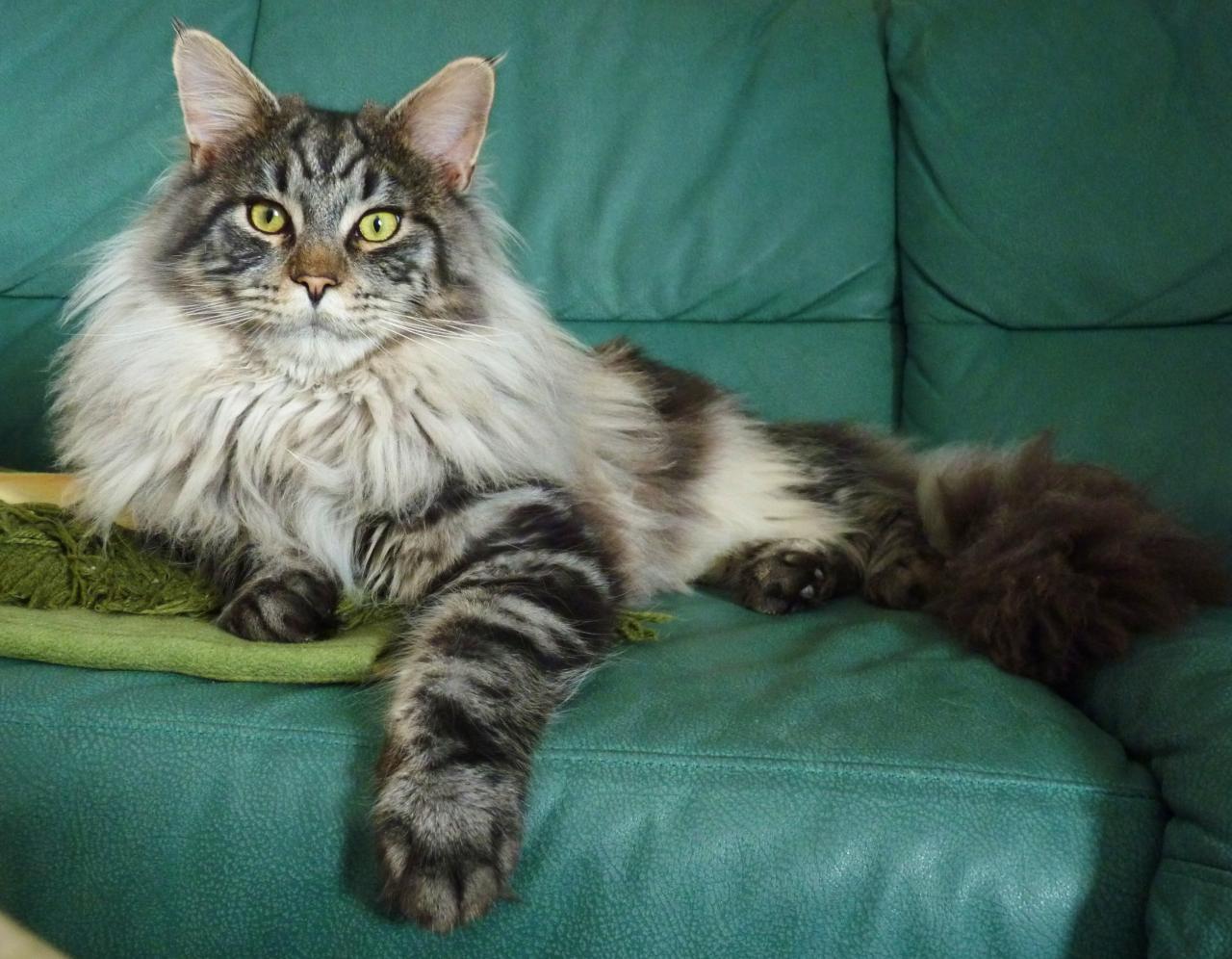
Maine Coon kittens thrive in environments that provide ample space for exploration and play. Their playful and curious nature requires an abundance of toys and enrichment activities to keep them entertained and mentally stimulated.
Living Environment
An ideal living environment for Maine Coon kittens includes:
- Spacious home:A large house or apartment with plenty of room for them to run, jump, and climb.
- Cat trees and climbing structures:Maine Coons love to climb, so providing them with vertical spaces is essential.
- Window perches:These allow kittens to observe the outside world and bask in the sunlight.
- Interactive toys:Toys that encourage chasing, batting, and pouncing help kittens develop their natural hunting instincts.
- Puzzle feeders:These toys challenge kittens mentally and provide a fun way to feed them.
Exercise and Play
Exercise and play are crucial for the physical and mental well-being of Maine Coon kittens. Regular play sessions help them burn off energy, develop coordination, and socialize with their human family.
Interactive Games
Some interactive games that Maine Coon kittens enjoy include:
- Chase the laser pointer:This classic game provides endless entertainment for kittens.
- Fetch:Some Maine Coons enjoy retrieving small toys or balls.
- Hide-and-seek:Kittens love to explore and find hidden treats or toys.
- Interactive wands:These toys allow kittens to chase and bat at feathers or other attachments.
- Catnip:A small amount of catnip can provide a burst of energy and excitement for kittens.
Grooming and Maintenance
Maine Coon kittens require regular grooming to maintain their luxurious coats and overall health. This includes brushing, bathing, and nail trimming.
Brushing, Maine coon kittens ct
Brush your kitten’s coat at least twice a week, using a wide-toothed comb or a slicker brush. Start at the head and work your way down the body, brushing in the direction of hair growth. Regular brushing removes loose hair, prevents mats and tangles, and distributes natural oils throughout the coat, promoting a healthy shine.
Bathing
Maine Coon kittens typically do not require frequent bathing. However, if your kitten gets particularly dirty or develops a skin condition, you may need to bathe them. Use a gentle, cat-specific shampoo and lukewarm water. Wet the kitten’s coat thoroughly, apply the shampoo, and massage it gently into the fur.
Rinse the shampoo thoroughly and towel dry the kitten.
Nail Trimming
Trim your kitten’s nails every two to three weeks. Use a sharp nail clipper specifically designed for cats. Hold the kitten’s paw gently and trim the sharp tips of the nails. Avoid cutting too close to the quick, which is the pink part of the nail containing blood vessels.
If you accidentally cut the quick, apply a small amount of cornstarch or baking soda to stop the bleeding.
Nutrition and Feeding: Maine Coon Kittens Ct
Maine Coon kittens have specific nutritional needs to support their rapid growth and development. Their diet should be high in protein and fat to provide the energy they need. It should also contain essential vitamins and minerals, such as taurine, which is important for heart health.When
choosing a kitten food, look for one that is specifically formulated for Maine Coons. These foods will have the right balance of nutrients for your kitten’s needs. Some good brands of kitten food for Maine Coons include:* Royal Canin Maine Coon Kitten
- Hill’s Science Diet Kitten Healthy Development
- Purina Pro Plan Focus Kitten Chicken & Rice Formula
Feeding Schedule
The amount of food you feed your kitten will depend on their age and activity level. A general rule of thumb is to feed kittens 1/2 cup of food per day, divided into two or three meals. Kittens should be fed more frequently than adult cats, as their stomachs are smaller and they need to eat more often to maintain their energy levels.As
your kitten grows, you will need to adjust the amount of food you feed them. Adult Maine Coons typically eat 1-2 cups of food per day, divided into two meals.
Fresh Water
It is important to provide your kitten with fresh water at all times. Water helps to keep them hydrated and supports their overall health. You can encourage your kitten to drink more water by placing water bowls in multiple locations around your home.
You can also add a little bit of tuna juice or chicken broth to the water to make it more appealing to your kitten.
Cost and Expenses
Bringing a Maine Coon kitten into your home is a rewarding experience, but it also comes with financial responsibilities. Understanding the potential costs associated with owning a Maine Coon can help you make an informed decision and prepare for the expenses involved.
Adoption Fees
Adoption fees for Maine Coon kittens in Connecticut can vary depending on the shelter or breeder you choose. Typically, adoption fees cover the cost of spaying or neutering, initial vaccinations, and deworming. The average adoption fee ranges from $300 to $600.
Veterinary Care
Regular veterinary checkups, vaccinations, and parasite control are essential for maintaining your kitten’s health. The cost of veterinary care can vary depending on the location and services provided. Annual wellness exams typically range from $100 to $200, while vaccinations and deworming can cost around $50 to $100 per visit.
Food and Supplies
Maine Coons are known for their large size and hearty appetite. The cost of food can vary depending on the quality and brand you choose. High-quality cat food can range from $20 to $40 per bag. Other supplies, such as litter, litter boxes, toys, and grooming tools, can add an additional $50 to $100 per month.
Spaying or Neutering
Spaying or neutering your Maine Coon kitten is a crucial step in responsible pet ownership. The cost of this procedure can range from $150 to $300.
Emergency Treatments
Even with the best care, unexpected illnesses or accidents can occur. Emergency veterinary treatments can be expensive, so it’s wise to consider pet insurance or set aside an emergency fund to cover unexpected expenses.
Budgeting Tips
To budget effectively for the ongoing expenses of Maine Coon ownership, consider the following tips:
- Research adoption fees and veterinary costs in your area before bringing a kitten home.
- Purchase high-quality food and supplies that meet your kitten’s nutritional and enrichment needs.
- Consider pet insurance to help cover unexpected veterinary expenses.
- Set aside a monthly budget for routine care and unexpected costs.
- Explore discounts and promotions offered by shelters, veterinarians, and pet supply stores.
By planning ahead and budgeting wisely, you can ensure that your Maine Coon kitten receives the best possible care and enjoys a long and healthy life.
Closing Notes
As we bid farewell to the captivating world of Maine Coon kittens ct, we hope this guide has ignited a passion within you for these extraordinary felines. Remember, the journey of owning a Maine Coon is filled with endless love, laughter, and the unwavering companionship of a loyal friend.
Embrace the adventure and cherish every moment with your beloved Maine Coon kitten.
